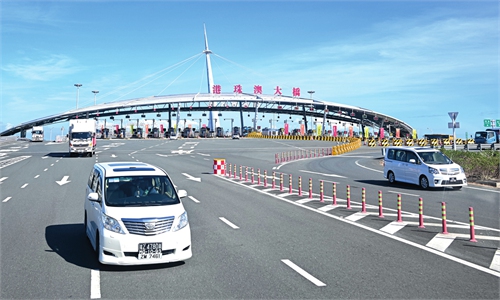Hong Kong SAR removes property restrictions, sparks a surge in mainland buyer visits

The view of Hong Kong Photo: VCG
The Hong Kong Special Administrative Region (HKSAR) has scrapped all property-related demand-side curbs, sparking a surge in market activity -- including a significant increase in buyers from the Chinese mainland, the Global Times has learned.
In the first 10 days of March, more than 1,600 transactions for new homes were registered, nearly five times the total for February, Tom Chen, founder of local agency One Sand of World Property Technology, told the Global Times on Monday.
Citing sales records of a developer that he described as the "most popular one in Hong Kong," Chen said that about 20 percent of the buyers came from the Chinese mainland.
Hong Kong's property prices have hit their lowest point in nearly seven years, but rental rates are at their highest levels in six and one-half years. This has led some investors to purchase properties for rental purposes, with some even buying 5 units or more at a time, Chen said.
The phenomenon, unseen in the past two to three years, has become common in the past 10 days, he added.
Mainland buyers who are interested in purchasing property in Hong Kong mainly fall into four categories: those who are familiar with Hong Kong, those who are planning to move to the region, those with experience in overseas property investment, and those who have lived in Hong Kong for some time, according to Chen.
These people either have a genuine need for property or see lucrative investment returns, he said.
On February 28, the HKSAR government announced plans to remove all demand-side management measures for residential properties with immediate effect.
"In other words, the Special Stamp Duty, the Buyer's Stamp Duty and the New Residential Stamp Duty will no longer be charged on all residential property transactions from February 28, 2024, onwards," read the announcement.
The measures were introduced 14 years ago. HKSAR Financial Secretary Paul Chan Mo-po said the measures are not necessary any longer, given the market conditions that are "very different now compared with 2010."
"Taking into account the current market situation, the future supply, the economic situation, we think now is the appropriate time to remove these measures, and let the market adjust itself," Chan said at a press conference.
"The immediate assessment is that with the removal of these measures, volume will likely go up," Chan said, noting that the move is expected to help stabilize market confidence.
A Beijing resident surnamed Zhang was among the first batch of potential buyers flocking to Hong Kong after the removal of the measures.
Zhang told the Global Times that she had started looking into buying a property in Hong Kong before the policy was announced because her son is studying at the University of Hong Kong. After the new policy was introduced, she purchased a property near the university. She explained that she has a genuine need for personal use and also sees promising rental returns in the future due to the property's prime location.
Last year, Hong Kong adjusted its property purchase policies. The latest move removes the previous restrictions, demonstrating a very positive policy direction, Yan Yuejin, research director at Shanghai-based E-house China R&D Institute, told the Global Times on Monday.
Such adjustments reduce tax costs and significantly increase the cost-effectiveness of purchasing new homes in Hong Kong, Yan said.
After the removal of the measures, the stamp duty rate for local Hong Kong residents purchasing properties will be reduced from 7.5 percent to 1.5 percent, while for mainland buyers, the rate will be reduced from 15 percent to 4.25 percent. This represents a tax discount of 10.5 percent.
Global Times


